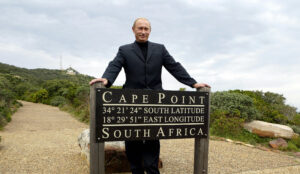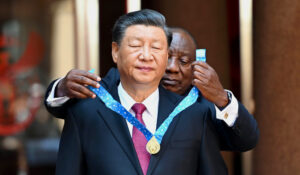The death of Yevgeny Prigozhin, master mercenary, readily evokes a host of analogies: Hitler’s Night of the Long Knives, King Phillip IV’s immolation of the Knights Templar, the Biblical injunction that he who takes up the sword shall.
I have no personal experience of Wagner, nor can I claim to know why Prigozhin was killed or by whom. Russia is like Africa, they effortlessly spin impenetrable mysteries in which the impossible becomes the truth, the possible the lie.
But I can claim to know a little about mercenaries in Africa. In my youth I co-authored a book with one of the continent’s more elusive mercenaries, a Congo veteran who was regarded as so passe by publishers that they declined to publish his story until he suddenly popped up, as mercenaries do, as part of a coup against an Indian Ocean island in 1982.
His name was Jerry Puren and he served as a mercenary in the secessionist Katanga province, later Shaba, in the Congo from 1961 until 1963. United Nations action drove him into Belgian exile with Moise Tshombe, the deposed Katangese President. He was present at Ndola in Zambia, then Northern Rhodesia, when the UN Secretary General Dag Hammarskjold was killed on a peace mission in 1961 in a mysterious aircraft crash. Puren always insisted to me that he had been merely passing through; it was the Americans what done it.
When Soviet-backed rebels swept into the Eastern Congo in the mid-Sixties to overthrow the Western-supported President Mobutu Sese Seko, the CIA raised a mercenary force of mostly South Africans, named Five Commando, later promoted as The Wild Geese (another historical analogy), and sent them to stop the insurgency. They did. Puren returned with Tshombe but overstayed his welcome: ensnared in the abortive Katangese Gendarmes coup of 1967, led by Belgian and French mercenaries with impossible tabloid-generated names such as Black Jack Jean Schramme and Demon Bob Denard.
Puren ended up in dead-end jobs in South Africa until again called to the colours, the green-back ones. Together with Mike Hoare, former commander of Five Commando, they launched an abortive coup against the Seychelles Government of Rene Albert in November 1982 with a hotch-potch of South African military adventurers. He had promised to take me, a hungry young journalist, on his next mission but stood me up. Just as well: it could have been a career-limiting move.
Hoare and the gang escaped by hijacking an Air India aircraft. Puren, part of a one-man self-designated forward reconnaissance unit, was left behind. As he heard the aircraft thundering overhead, he admitted to himself that he was in big shit. He spent 19 days in hiding before surrendering. Together with four other advance party scouts also captured, he was sentenced to death. Only the intercession of Archbishop Desmond Tutu saved them. Diplomacy got them an early release.
But the spirit never dies. When he heard that I was reporting on the wars in southern Angola in the mid-Eighties, he asked me to take a proposal to UNITA rebel leader Jonas Savimbi. At over 70 years and in an age of Mig-23’s, Rooivalk attack helicopters and Mi-24 helicopters, Puren offered to build Savimbi an air force. Such the limitless optimism and naiveté of the old-style mercenary.
Puren died impoverished in a rough part of the port city of Durban. His death was hastened, his wife Julia insisted, when they were attacked and robbed in their apartment by two students from a nearby college. She said he had the look in his eyes she had seen so often in the Congo, the look of a man about to die.
Yet I learnt some things from Puren and his mob. First, many mercenaries of that era were disconcertingly charming and interesting, some educated, but all entirely lacking an internal moral compass. The lure of excitement and money suborned all nobler aspirations.
Second, most died broke. The same impetuosity that drove them to freebooting rapidly dissipated the proceeds. None seemed to regret either their lives or their penury: they lived and died content with the embers of their memories.
Third, Puren’s generation of African freebooters are as lost a phenomenon as the Victorian adventurers who studded the history of that trampling march towards global hegemony. Gangster mercenaries served in the Biafran and early Angolan wars of the Seventies. The more professional Executive Outcomes, the South African mercenary group comprising veterans of the 15-year border wars operated in Angola, Sierra Leone and Papua New Guinea in the Nineties. They were the forerunners of the modern Private Military Companies (PMCs), the most notable being Blackwater (now Academi), which supported the Western efforts in Afghanistan and Iraq. Wagner is proud to claim it as its conceptual progenitor, but Wagner, through its franchises, is infinitely more dangerous and untethered, perhaps more so now that its leaders are gone.
There is a fourth thing I learnt about mercenaries. They are dodgy employees, capable of switching sides at a moment’s notice or taking out their leaders. Just ask the Romans. Vladimir Putin has belatedly grasped the point which is why he is asking Russian mercenaries to sign pledges of allegiance to Russia. In a world in which developed countries are too refined to commit their military to the wet-end business of war, there will always be room for a Wagner. And so another historical analogy: after 500 years, the Middle Age private fighting companies, the Condottiere, are back big time.
Disclaimer
Some of the posts we share are controversial and we do not necessarily agree with them in the whole extend. Sometimes we agree with the content or part of it but we do not agree with the narration or language. Nevertheless we find them somehow interesting, valuable and/or informative or we share them, because we strongly believe in freedom of speech, free press and journalism. We strongly encourage you to have a critical approach to all the content, do your own research and analysis to build your own opinion.
We would be glad to have your feedback.
Source: UnHerd Read the original article here: https://unherd.com/



